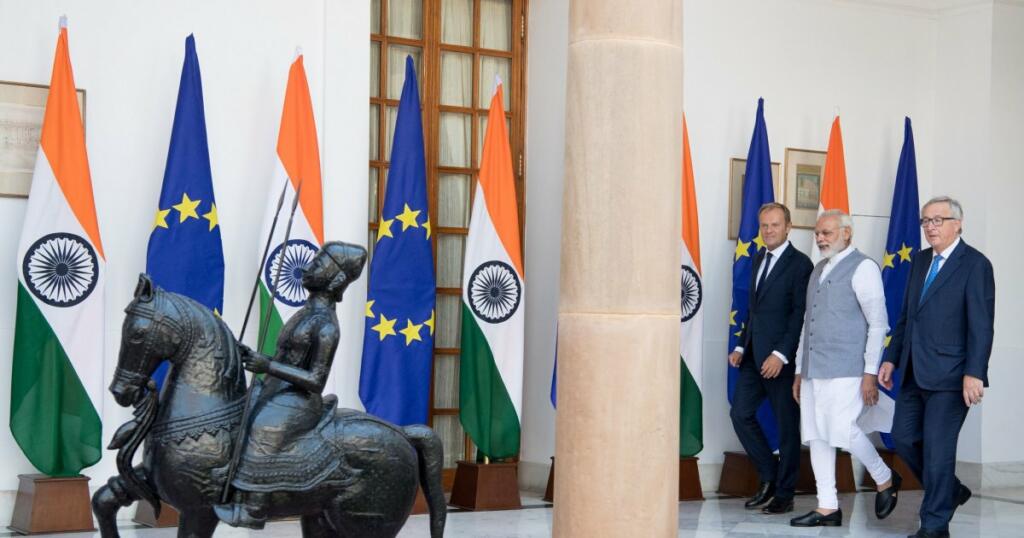- We have come full circle. Firstly, Europeans came to India to exploit the Golden Bird. Then, they left us in a dilapidated state in 1947. 74 years down the line, the European Union (EU) has realised that they can’t afford to stay away from India. That is why, in spite of India’s tacit support to Russia, they are trying to please the Modi government.
EU delegation in India
The EU has sent a coveted delegation of seven senior Parliamentarians to push for a better trade pact with India. According to a report by Hindustan Times, Leaders of the bloc want to increase the bilateral trade to over $220 billion in five years.
Apparently, when it comes to securing a trade deal with India, the EU is lagging behind in competing with countries like the United Arab Emirates (UAE) and Australia. Recently, India signed separate early harvest deals with both aforementioned countries. Early harvest deals are precursors to free trade agreements (FTAs) between two geographical entities. It is only after the initial results of these deals provide positive outcomes that the countries decide to sign full-fledged FTAs.
Read more: India-Australia’s historic FTA gives major heartburn to China
EU recently had a chequered history with India
Bernd Lange, Chairperson of the European Parliament’s Committee on International Trade (INTA), leads the European delegation. The delegation is eager to chalk out similar trade deals with India as UAE and Australia. The last time such a kind of negotiation took place was way back in 2013. It was the 16th and last round of failed negotiations around the Broad-based Trade and Investment Agreement (BTIA) which was started in 2007.
Fed up with all these, the Modi government had decided to do away with the already existing Bilateral Investment treaty with 23 countries of EU blocks in 2016. The EU had vehemently criticised this move and asked India to retain individual treaties. But, the Modi government refused to get browbeaten and maintained its stance. It insisted that any kind of future negotiations will be guided by the model BIT issued by the government in 2015.
Positive signs for the deal
Before the visit by its Parliamentary delegation, EU had conveyed its intent to a team of Indian government officials led by commerce secretary B.V.R Subrahmanyam. A person cited by Hindustan Times said, “The EU has agreed to start formal negotiations soon after it will conceptualise a basic framework to proceed on this matter with New Delhi. It may take three rounds of discussions that may conclude within this year,”
Influential industry bodies in India seem to be in support of the expected deal. A senior Indian official cited by Moneycontrol said, “The introductory talks on the deal this time around were set to be predicated on initial recommendations from industry groups. All major industry bodies in India including the Federation of Indian Chambers of Commerce & Industry (FICCI) and the Confederation of Indian Industry (CII) have supported a deal with Europe,”
EU and India are sliding away from China
Currently, the EU is India’s third-largest trading partner. In 2022, both countries did trade worth $104.3 billion. Currently, both the EU and India are dissociating their trade relations with China. Recently, a trade deal that would allow businesses from EU and China to invest in respective geographies was freezed by Brussels. Moreover, China and Russia’s closeness is also putting moral pressure on the EU to do away with economic arrangements with Communist nation.
Read more: After US and India, the European Union now wants to destroy China’s BRI ambitions
Similarly, after the Galwan valley clash, India has immensely decreased its trade relations with China. The country is promoting its indigenous manufacturing to weed out Chinese influence from its consumer market.
While India has mounted its efforts to find more allies, the EU is by and large stuck in this regard. On one hand, India has struck a fine balance between Russia and USA in the ongoing war, while on the other hand jingoism and unnecessary moral posturing by European leaders have made it difficult for the bloc to maintain a stable Economic relationship with any country other than the USA.
Read more: The European Union just lost a large chunk of its economy, almost the size of Greece
Moral posturing does not stand the test of Economic reality
The internal distrust among member nations has only exacerbated their issues. The EU was once India’s second-largest export destination. In 2021, it was not even in the top 10. The EU wants to take it further. It is in their interest. That is why European leaders have not issued categorically castigating criticism of India’s tacit support to Russia in the ongoing Ukraine-Russia crisis.
No matter how much idealism a country professes, they will choose resources over any moral posturing when it comes to hard reality. The EU trying to bring itself into India’s fold is just a manifestation of this principle.
